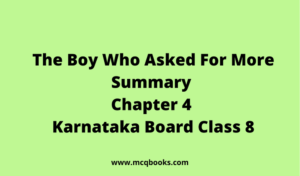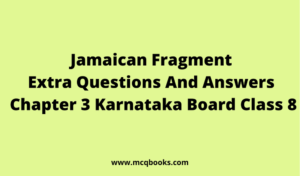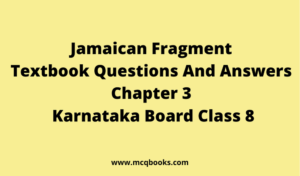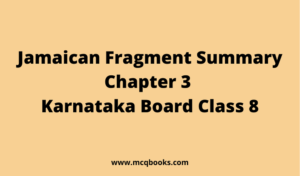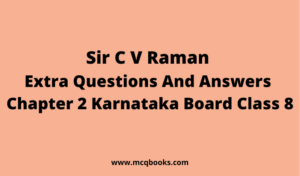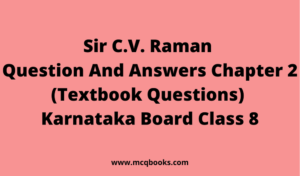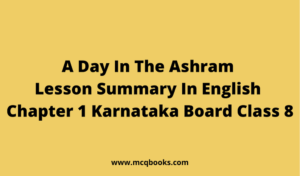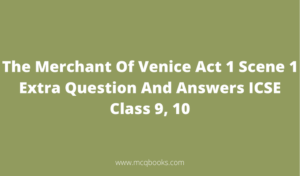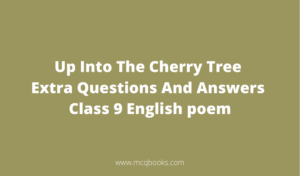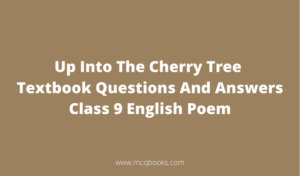The Boy Who Asked For More Textbook Questions And Answers Chapter 4 Karnataka Board Class 8
English is a difficult subject for many people to learn. Some students may become frustrated and give up, but here’s The Boy Who Asked For More Textbook Questions And Answers Chapter 4 Karnataka Board Class 8 to help you maintain your momentum! This The Boy Who Asked For More Textbook Questions And Answers Chapter 4 Karnataka Board Class 8 will provide all necessary information needed in order to study KSEEB Class 8 English successfully at home or school.
The Boy Who Asked For More Textbook Questions And Answers Chapter 4 Karnataka Board Class 8 makes it easier to understand the story. Understanding every detail of a story is important for scoring higher on an exam and expert writers have made sure that you know how everything flows together by summarizing perfectly!
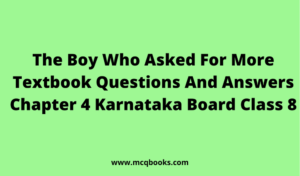
Textbook Questions and Answers:
C1. Answer the following questions and share your responses with your partner.
Question 1.
Where was Oliver Twist born?
Answer:
Oliver Twist was born in the poorhouse of a small town.
Question 2.
Who was present when Oliver was born?
Answer:
A doctor and an old poor woman were present at the time of Oliver’s birth.
Question 3.
What happened to the mother as soon as the child was born?
Answer:
Oliver’s mother died as soon as he was born.
Question 4.
What did the mother look like while she was alive?
Answer:
She was a good looking young woman.
Question 5.
Who was Mr Bumble?
Answer:
Mr Bumble was an officer in the town.
Question 6.
How did Mr Bumble treat the children?
Answer:
Mr Bumble starved and ill-treated the children under his case.
Question 7.
What did Oliver’s friends want him to ask the master?
Answer:
Oliver’s friends wanted him to ask the master for more gruel.
C2. Answer the following questions and share your responses with your partner.
Question 1.
How were the children fed in the house?
Answer:
The children were fed in a large stone hall. A metal basin with watery gruel would be kept at one end of the hall. The master stood by the basin and served each child with a small bowl of watery gruel.
Question 2.
Why was a council held by the boys? What did they decide on it?
Answer:
The children in the poor house never had enough to eat or drink. They were always hungry. One of the bigger boys announced that he would eat the boy who slept next to him if he was not given an extra bowl of gruel. The smaller boys were afraid. They held a council and decided that Oliver would go and ask the master for more gruel that night.
Question 3.
What did Oliver ask his master for?
Answer:
Oliver asked his master for some more gruel.
Question 4.
How did the master react to the request of Oliver?
Answer:
Though the master was a fat and healthy man, he turned very pale when he heard Oliver’s request. He said ‘What !’ as if he could not believe his ears.
Question 5.
What was the punishment that Oliver got for “asking for more”?
Answer:
Oliver was locked up in a room to spend the night alone.
Question 6.
What did Mr Bumble ultimately decide to do with Oliver?
Answer:
Mr Bumble decided to send Oliver out of the poorhouse. He offered a reward of five pounds to any person who would take Oliver permanently away from the poorhouse.
Question 7.
What was Oliver’s crime, according to Mr Bumble?
Answer:
In Mr Bumble’s opinion, asking for more food was the crime committed by Oliver.
C3. Read and discuss your responses with your partner. Then write.
Question 1.
Briefly explain the circumstances under which Oliver Twist was born.
Answer:
Oliver Twist was born to a poor woman of a little town on a cold black night in the winter of 1837.
Question 2.
How can you say that Oliver’s mother was a poor woman?
Answer:
Oliver’s mother was a young, good looking woman. She was found lying in the street of a small country town. Her shoes had been torn to pieces. No one knew where she had come from, or where she had been going.
Question 3.
What kind of a man was Mr Bumble?
Answer:
Mr Bumble was a cruel and selfish man. He thought very greatly of himself. He ill-treated and starved the children of the poor house.
Question 4.
Why were the boys always hungry?
Answer:
The boys were always hungry because they never got enough to eat or drink.
Question 5.
How did the children plan to satisfy their hunger?
Answer:
The children decided that Oliver should go to the master after supper and ask for more food.
Question 6.
What was the result of Oliver’s request for more food?
Answer:
Mr bumble came and Oliver was immediately locked in a room to spend the night alone. That was the punishment to Oliver for asking for more food.
Question 7.
Why did Mr Bumble get a notice posted outside the gate? Explain.
Answer:
Mr Bumble considered Oliver’s request for more food, a crime. He thought it was a revolt against his authority. He feared that the others would follow Oliver in the days to come, So, he wanted to force him out of the poor house.
Question 8.
Sum up Oliver’s birth and his life in the poorhouse.
Answer:
Oliver was born on a dark, cold winter night in the poor house of a small town. As soon as he was born, his mother died. He was taken into the poorhouse. Mr Bumble, the town beadle, gave him the name Oliver Twist. He and the other children were ill-treated and starved in that house. They did not get sufficient food to eat. They were always hungry. Oliver grew up to be a thin, pale boy of eight years. He was never treated kindly by anyone. He longed for kindness, compassion, and love.
Question 9.
Briefly narrate the events that led to Oliver being locked up in a room.
Answer:
As Oliver asked for more food, the master aimed a blow at his head, seized him by his arms, and called Mr Bumble. Mr Bumble came and Oliver was immediately locked in a room to spend the night alone.
C4. Match the descriptive words that go with the characters listed below.
Oliver Twist-
hungry, pale, thin, frightened, submissive
Oliver’s Mother-
Poor, miserable, good-looking
Mr Bumble-
fat, cruel, tyrannical
C5. Look at the following headings. Choose the best among them for the paragraphs indicated. Write them against the numbers.
Paragraph
1. Birth of an orphan.
2. Death of the mother.
3. Boy’s admission to the poorhouse.
4. Naming of the boy.
5. Boys holding a Council.
6. Oliver is forced to ask for more.
7. Mr Bumble’s reaction.
8. Punishment.
Vocabulary:
V1. Underline the word that does not belong to the group in each case.
farmer, farmer, doctor, teacher e.g. former
ate, swallowed, smelt, gulped
miserable, sad, agile, sorrowful
stated, said, narrated, heard
quickly, hastily, rudely, immediately
weak, pale, robust, thin.
Answer:
former
smelt
agile
heard
rudely
robust.
V2. Look at the following two words:
(i) appoint
(ii) appointment
The first is a verb and the second is a noun. We add ‘-meant to the verb and get the noun. Given below is a list of nouns. Some are made out of verbs. Pick out those words which are made out of verbs.
a) movement – g) measurement
b) cement – h) regiment
c) amazement – i) astonishment
d) development – j) government.
e) instrument – k) moment
f) establishment – l) garment.
Answer:
a) movement – c) amazement
d) development – f) establishment
g) measurement – i) astonishment
j) government.
V3. Write down the noun forms of the following verbs. They do not take the suffix ‘-ment’ ending. [You may consult a dictionary if you like]
e. g. invent — invention
i) born
ii) suggest
iii) exist
iv) grow
v) tire
vi) think
Answer:
i) born – birth
ii) suggest – a suggestion
iii) exist – existence
iv) grow – growth
v) tire – tiredness
vi) think – thought
C. Grammar:
Framing questions:
Task 1. Frame questions for the following statements. One is done for you.
A. Eg: Sujay and Supriya are Radha’s cousins.
Are Sujay and Supriya Radha’s cousins?
1. The pet dog is called Rambo.
2. The children are happy.
3. He is practising yoga.
Answers:
1. Is the pet dog called Rambo?
2. Are the children happy?
3. Is he practising yoga?
B. Eg: Radha likes sweets.
Does Radha like sweets?
1. She visits her aunt’s place every summer.
2. She loves playing with her cousins.
3. He likes reading storybooks.
Answers:
1. Does she visit her aunt’s place every summer?
2. Does she love playing with her cousins?
3. Does he like reading storybooks?
C. Eg: The children love playing with Rambo.
Do the children love playing with Rambo?
1. The kids practise yoga every morning.
2. Reshma and Rahim like to play with Raghu.
3. They enjoyed the vacation.
Answers:
1. Do the kids practice yoga every morning?
2. Do Reshma and Rahim like to play with Raghu?
3. Did they enjoy the vacation?
Task 2. Frame questions for the statements given below using the question words given in brackets. Do not forget to put the question mark.
This novel was written in 1946. (When)
The briefcase was stolen at the station. (Where)
The auditorium was constructed last year. (When)
The money was collected by the students. (By whom)
They have bought six plants for my garden. (How many)
His house was destroyed by fire. (How)
The servant let out the secret. (Who)
Sunder visits his parents twice a week. (How often)
You have selected this book. (which)
Janaki waited for two hours to consult the doctor. (How long)
It is his fault, (whose)
Answers:
When was this novel written?
Where was the briefcase stolen?
When was the auditorium constructed?
By whom was the money collected?
How many plants have they bought for my garden?
How was his house destroyed?
Who let out the secret?
How often does Sunder visit his parents?
Which book have you selected?
How long did Janaki wait to consult the doctor?
Whose fault is it?
D. Writing:
Task 1. Look at the following table. Some important facts about Ruskin Bond are given. Write a paragraph based on the information provided.
Answer:
Rudkin Bond, a famous novelist and storyteller, was born at Kasauli in Himachal Pradesh on 19 May 1934. He stays in Mussoorie. He is the author of many novels and short stories. His books have been translated into many European and Indian languages. Ruskin Bond was awarded the Kendra Sahitya Akademi Award in 1992.
It is important for a learner to read stories thoroughly and accurately in order to score better in KSEEB Class 8 English exams. The Boy Who Asked For More Textbook Questions And Answers Chapter 4 Karnataka Board Class 8 has been given by experts to ensure that the story can be easily understood. Hope you found this The Boy Who Asked For More Textbook Questions And Answers Chapter 4 Karnataka Board Class 8 helpful.
